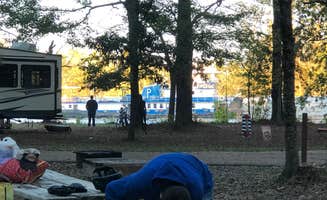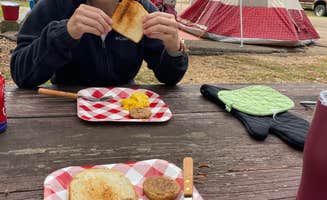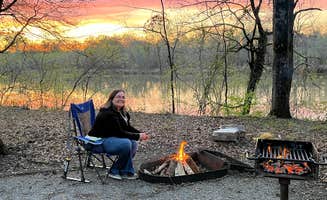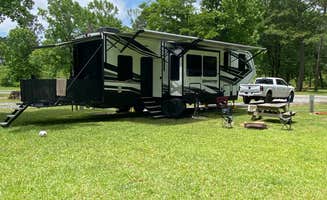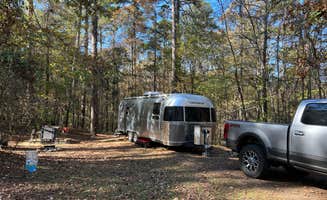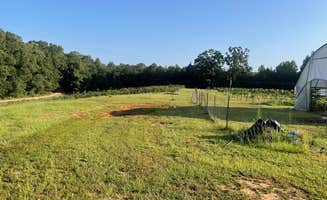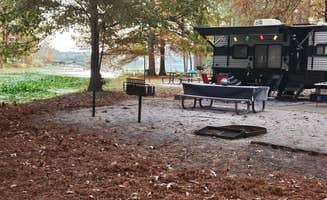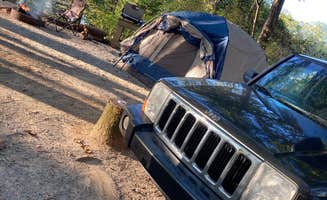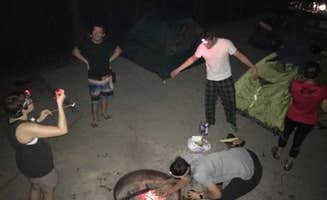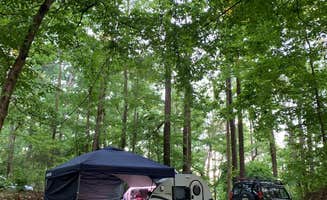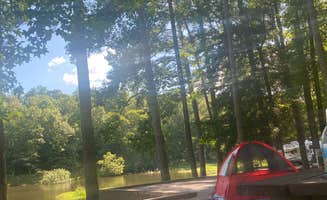The Tennessee-Tombigbee Waterway corridor stretches across western Alabama and eastern Mississippi, covering 234 miles of interconnected rivers and man-made channels. Most established campgrounds sit along the Tombigbee River section where campers experience moderate humidity with summer temperatures averaging 90°F. Tent sites typically cost $15-25 per night while RV sites with hookups range from $25-45 depending on location and amenities.
What to do
Paddling excursions: At Dewayne Hayes Campground, kayakers can launch directly from waterfront sites. "We launch and paddle from our site. The walking path is about 3 miles round trip from the day-use boat ramp and playground to the campground end," notes Cyndi H.
Frisbee golf courses: Lake Lowndes State Park features a complete course suitable for beginners through advanced players. Richard W. mentions, "The park has a beautiful small lake for boating, fishing, and other water sports as well. Other things to do include an amazing frisbee golf course, tennis courts, softball fields, children's playground, hiking, biking, and a huge admin building with many indoor games like pool and ping pong."
Wildlife observation: The waterway's cypress sloughs attract diverse wildlife year-round. When staying at Deerlick Creek, Don K. reports, "We watched deer almost tamely walking around the campground," while other campsites offer opportunities to spot owls, armadillos, and waterfowl.
What campers like
Barge watching: Waterfront sites at Pickensville Campground provide unique views of commercial traffic. "Site 129 is directly on the water with a front row seat for watching the boats and barges. Another pleasant COE campground with friendly and helpful staff," writes one reviewer.
Uncrowded water access: Multiple water entry points allow for swimming and fishing without crowds. A visitor at Town Creek Campground observed, "We paddle in the area by the campground. Almost all motor boaters are very thoughtful in reducing their wake. Many people are fishing, some are catching and some families are out in pleasure boats cruising on the waterway."
Spacious, private sites: Campsites typically feature large concrete pads with ample separation. "Large sites, clean bathrooms. Sadly the playground and basketball courts were closed and we didn't know. We were on the riverside loop, we drove around to the other areas and it was overgrown," notes Ashley S. about her experience at Pickensville.
What you should know
Weather considerations: Summer brings hot, humid conditions while spring offers moderate temperatures with occasional storms. At Lake Lowndes State Park Campground, one camper reported, "We tent camped in the RV park with 4 dogs. Our campsite (10) was perfect- right on the water, plenty of space, nice even pad for our tent & canopy."
Water quality variations: Water clarity varies throughout the waterway system. Neil T. mentions about Pickensville Campground, "The water ran brown for a while. I'm guessing it just hadn't been used at our site over winter. It cleared up after a minute and I flushed it for another 5."
Insect preparation: Mosquitoes and ants require preparation, especially May through October. One Lake Lowndes visitor noted, "Nice state park with many amenities. The campground is located along a lake and many sites have nice views of the water. At about 4:00 am, we awoke to find ants invading the trailer. The outside of the trailer was covered with thousands of ants and they were pouring into the trailer."
Tips for camping with families
Playground access: Several campgrounds feature multiple play areas for different age groups. At Deerlick Creek, Suzanne Z. found, "This campground was unique as each site was set into the hills. We had lots of privacy and peaceful quiet. They had two play areas with balls and other toys for the kids."
Swimming options: Designated swimming areas provide safer alternatives to river swimming. According to Elizabeth J. about Lake Lurleen State Park Campground, "We love the swim area and it's always clean. They have a few small parks for kids, walking and bike trails, paddle boats, boat ramps, and ducks!"
Kid-friendly wildlife viewing: Morning and evening hours offer best opportunities for deer and waterfowl sightings. Richard W. from Lake Lowndes notes, "The scenery is magnificent and we fell in love with the ducks, geese, and deer families that run around every night."
Tips from RVers
Site selection strategy: Reserve waterfront sites 3-6 months in advance for prime locations. John R. from COE Service Campground advises, "Beautiful small park. Great riverside pull thru spots. All spots are sizable."
Hookup variations: Many campgrounds offer a mix of full-hookup and partial-hookup sites. Holley K. points out about Pickensville, "Site we stayed at had power and water hookups. They have a community dumping station. I think some of the sites have sewer hookup but ours didn't."
Leveling requirements: Bring leveling blocks as many sites have slight grades. Neil H. explains, "Campsite sizes vary, and it can be difficult to find a site for larger campers. Utility connections aren't always in the most appropriate spot (often need water hose or power cable of 25ft+)."


